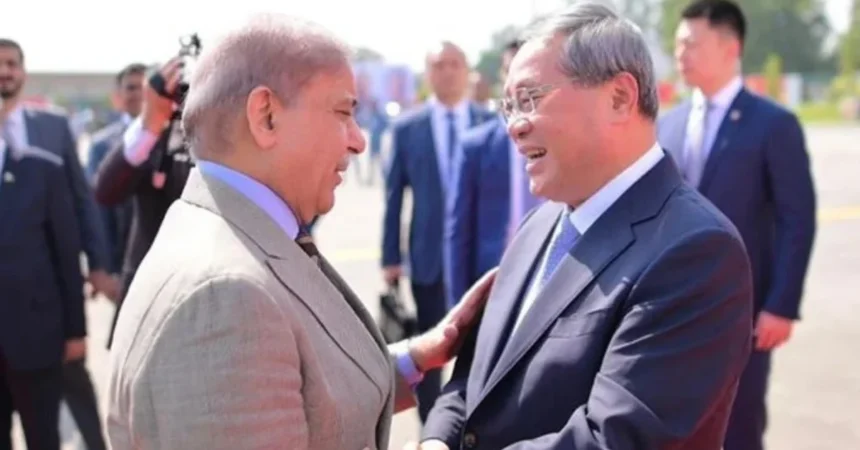Introduction
In a display of enduring friendship and collaboration, Pakistan rolled out the red carpet for Chinese Premier Li Qiang, who arrived in Islamabad on an official visit. This visit, part of a series of diplomatic engagements between the two countries, underscores the deep-rooted ties between Pakistan and China, historically characterized by mutual support and cooperation in various sectors, including trade, infrastructure, and defense. As the world witnesses shifting geopolitical dynamics, the strengthening of Pakistan-China relations holds immense significance for both nations and the broader region.
Historical Context of Pakistan-China Relations
Pakistan and China have shared a strong bilateral relationship since the 1950s, characterized by mutual respect and support. Over the decades, this partnership has evolved to encompass various sectors, from economic cooperation to military collaboration. The landmark China-Pakistan Economic Corridor (CPEC), a key initiative under China’s Belt and Road Initiative (BRI), has played a pivotal role in shaping the economic landscape of Pakistan, enhancing infrastructure, and promoting regional connectivity.
The relationship has stood the test of time, even amid global shifts and challenges. The strategic partnership has allowed both nations to navigate complex geopolitical terrains while fostering economic growth and stability. As Premier Li Qiang’s visit signifies a new chapter in this long-standing alliance, it is crucial to delve into the key aspects of the visit and its implications.
The Significance of Premier Li Qiang’s Visit
- Economic Cooperation
At the forefront of Premier Li Qiang’s agenda is the enhancement of economic ties. The two nations are expected to discuss further investments in various sectors, including energy, infrastructure, and technology. With China’s vast economic capabilities, this visit presents an opportunity for Pakistan to attract more Chinese investments, which are essential for bolstering its economy, especially in light of recent challenges.
- Bilateral Agreements
During the visit, multiple agreements are anticipated to be signed, focusing on trade facilitation, technology transfer, and infrastructure development. These agreements will lay the groundwork for future collaboration, enabling both countries to benefit from each other’s strengths. The visit signifies a commitment to deepening economic ties, with a particular emphasis on CPEC’s ongoing projects.
- Regional Stability
The geopolitical landscape in South Asia has witnessed significant changes in recent years. With tensions in the region, the partnership between Pakistan and China is crucial for ensuring stability and security. Both nations have historically supported each other on various international platforms, and this visit is expected to reinforce their commitment to mutual security and cooperation.
- Cultural Exchange
Beyond economic and strategic ties, the visit aims to foster cultural exchanges between the two nations. Promoting people-to-people connections will enhance understanding and cooperation at various levels, further solidifying the bond between the citizens of both countries.
Key Agenda Items
As Premier Li Qiang embarks on this important visit, several key agenda items are likely to dominate discussions:
- CPEC Development
The continuation and acceleration of CPEC projects will be a top priority. Both sides are expected to review the progress of ongoing initiatives and discuss future projects to enhance connectivity and boost economic development. This includes the completion of major infrastructure projects, such as roads, railways, and energy facilities, which are critical for Pakistan’s growth.
- Trade Relations
With trade between Pakistan and China witnessing steady growth, the two nations will explore avenues to enhance trade relations further. Reducing trade barriers and improving logistics will be critical topics during discussions. The goal is to increase bilateral trade volume and explore new markets for Pakistani products in China.
- Technological Collaboration
Given the rapid advancements in technology, collaboration in the technology sector will be a focal point. Pakistan aims to benefit from China’s technological expertise, particularly in areas such as telecommunications and digitalization. This collaboration could also extend to research and development, paving the way for innovation in various fields.
- Defense Cooperation
The defense ties between the two countries are robust, and discussions on enhancing military cooperation, joint exercises, and defense procurement are expected to take place. This collaboration is vital for addressing security challenges in the region. The two countries have a history of joint military training and sharing defense technology, which is likely to continue and expand.
- Regional Connectivity
The discussion will likely encompass the broader context of regional connectivity, particularly regarding trade routes that enhance access to Central Asia and beyond. Both nations recognize the importance of interconnectedness for economic growth, and initiatives aimed at developing transportation corridors will be a focus of this visit.
Implications for Pakistan
Premier Li Qiang’s visit holds significant implications for Pakistan’s socio-economic landscape:
- Economic Boost
Increased investments from China can provide a much-needed boost to Pakistan’s economy, creating job opportunities and enhancing infrastructure development. The inflow of capital is expected to stimulate growth in key sectors, including construction, energy, and technology.
- Geopolitical Stability
Strengthening ties with China can help Pakistan navigate the complexities of its geopolitical situation, particularly in light of tensions with neighboring India. The support from China can serve as a counterbalance in regional dynamics, contributing to Pakistan’s security and stability.
- Cultural Awareness
Enhancing cultural exchanges will foster better understanding between the peoples of Pakistan and China, promoting goodwill and friendship. Initiatives aimed at improving people-to-people connections can create a positive atmosphere for collaboration.
- Sustainable Development
Collaborating on projects focused on sustainable development will align with global efforts to address environmental challenges while ensuring economic growth. This includes initiatives in renewable energy and infrastructure that are environmentally friendly and sustainable in the long term.
Reactions from the Political Sphere
The visit has garnered significant attention from political leaders and analysts in both countries. In Pakistan, political leaders from various parties have expressed support for the visit, emphasizing the importance of strengthening ties with China. They recognize that enhanced cooperation with China can provide the necessary support for Pakistan’s economic recovery and development.
Conversely, within China, Premier Li Qiang’s visit is seen as a reaffirmation of China’s commitment to its allies and partners. Chinese state media has emphasized the importance of the relationship, highlighting the need for mutual cooperation to address regional challenges. Political analysts in China view this visit as a strategic move to consolidate relationships with neighboring countries.
Challenges Ahead
While the visit symbolizes a positive trajectory for Pakistan-China relations, several challenges remain:
- Economic Dependencies
Increased reliance on Chinese investments may raise concerns about economic sovereignty. Pakistan must ensure that collaborations are mutually beneficial and do not lead to long-term dependencies. Striking a balance between attracting foreign investment and maintaining control over its economic policies will be critical.
- Public Sentiment
There is a need for public awareness regarding the benefits of Pakistan-China cooperation. Ensuring that citizens understand the positive impacts of these ties will be crucial for sustaining support. Efforts should be made to engage with the public and address any concerns regarding foreign investments.
- Geopolitical Tensions
The shifting geopolitical landscape, including tensions with other regional powers, can impact the dynamics of Pakistan-China relations. Maintaining a balanced approach will be essential to navigate these challenges and ensure that Pakistan’s interests are safeguarded.
- Implementation of Agreements
The success of any agreements signed during the visit will depend on their effective implementation. Both governments must work collaboratively to ensure that commitments translate into tangible outcomes. Regular monitoring and evaluation of progress will be necessary to achieve the desired results.
The red-carpet welcome for Chinese Premier Li Qiang signifies a pivotal moment in Pakistan-China relations. The visit underscores the commitment to strengthening economic ties, enhancing cooperation in various sectors, and fostering cultural exchanges. As both nations look to the future, the outcomes of this visit have the potential to reshape the socio-economic landscape of Pakistan while reinforcing the bond between two historically aligned countries. The challenges that lie ahead require careful navigation, but the overarching narrative remains one of partnership, growth, and shared aspirations.
#PakistanChinaRelations #LiQiangVisit #CPEC #EconomicGrowth #BilateralRelations #China #Pakistan #Investment #Trade #CulturalExchange







